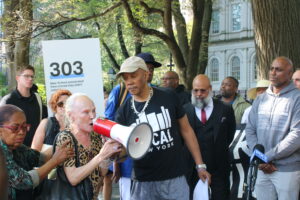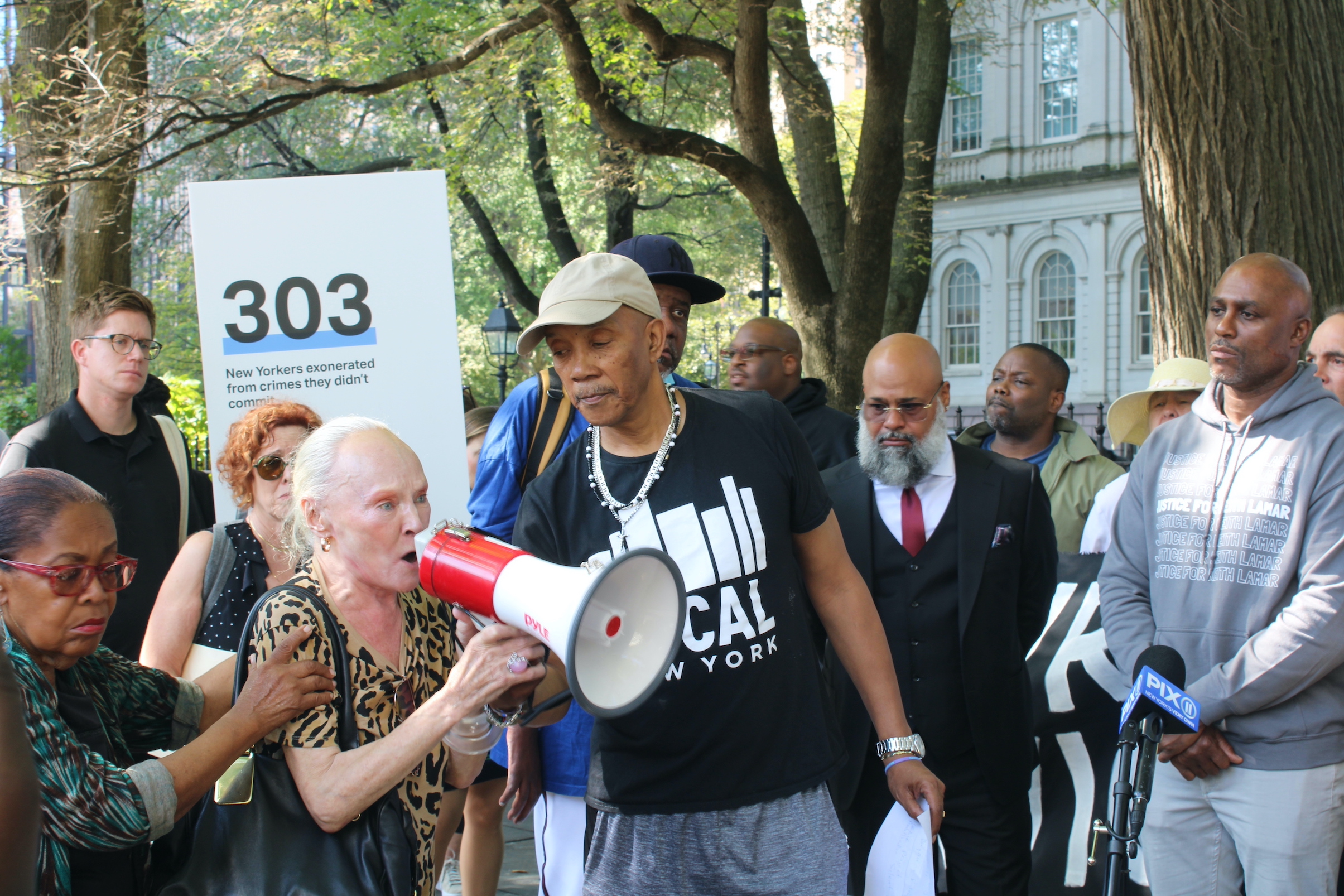Holding a megaphone and leading the crowd, a woman chants, “What do we want?” People shout back, “Justice!” She continued, “And when do we want it?” “Now!”
It’s a warm fall day in New York, and 70 people are gathered in front of City Hall in Manhattan on International Wrongful Convictions Day.
A man is holding a sign that reads “303,” the number of New Yorkers who have been exonerated for crimes they did not commit. With events scheduled all over the world to draw attention to the issue, the group in New York is making a plea to Governor Kathy Hochul. “Today we are simply asking for Governor Hochul to sign legislation that has already passed the Senate and the assembly, which is called the ‘Challenging Wrongful Convictions Act,'” said lawyer Martin Tankleff. “It’s something that she could easily do with one signature and make a difference in lives.”
Dressed in a grey suit with dark sunglasses, Tankleff is special counsel at Barket Epstein Kearon Aldea and LoTurco, a leading firm in criminal defense, personal injury and federal civil rights. He is also a professor at Georgetown University, and instructs students to explore past cases where there may have been a wrongful conviction. The course is called Making An Exoneree. But before Tankleff was a lawyer or professor, he was an inmate. At the age of 17, he was incarcerated after being convicted of murdering his parents. Tankleff falsely confessed under police duress, and spent almost 18 years behind bars until he was released in 2007.
His is a famous case in New York, and in 2018 he was awarded a $10 million settlement from Suffolk County. “I’ve been testifying about legislation in New York since 2008, and it’s about time the governor signs this legislation to help make a difference,” he said. “It doesn’t take much because, guess what, it was one signature in many of our cases that freed us, so why can’t the governor sign the bill today?”

Though the bill would help individuals in the state of New York, wrongful convictions plague the entire country. Kennedy Mattes, one of Tankleff’s former students, attended the event. Mattes is 23 and currently works as an investigator for a public defender’s office, before starting at Harvard Law School in two years. In the meantime, she is taking a class at Princeton which seeks to free people who were wrongfully convicted. Mattes is currently helping Ivery Dorsey, a man in Houston, Texas, who has been incarcerated for 17 years on homicide charges.
“I think the most upsetting part is an innocent person sitting in prison, which, most of the time have horrendous conditions,” said Mattes. “In Ivery’s particular case, a guy submitted an affidavit actually confessing to the crime, and he describes specific details of the crime, but that wasn’t enough. And so there gets to a point where it’s like, how do you move forward when the guy who actually did it, confesses to it? The frustrating part is actually proving your innocence in a system that doesn’t want to recognize your innocence after the fact.”
No amount of money can ever repair the damage done to the individuals, as well as their families. In the case of Arlene Normyle, the pain is written all over her face. Normyle is a petite elderly woman, but her voice is powerful. The moment she starts to speak into the megaphone, the crowd goes silent. Her son’s name is Sean Ryan, and she claims that he has been wrongfully incarnated for 47 years. He was first sentenced at 20 years old for a murder committed during a burglary, and was later charged while in prison for the murder of his codefendant, as well as arson of his cell. She visits him when she can at Attica Correctional Facility, but it’s hard.
“When he was younger I asked him what he wanted for Christmas. ‘Ten brothers,’ he responded,” she said. With tears in her eyes, Normyle grabbed my arm and explained to me that her son is writing a book to provide a new perspective and horrifying insight into the relationship between guards and inmates. Normyle presumes it will be titled “Ten Brothers.” As we were speaking, she paused to listen to the louder voice of an exoneree behind us, saying, “Everything he is talking about, my son has been through.”
When I had pulled out my DSLR camera to capture the event, a tall elderly man nudged me to ask why I was there. I saw him again toward the end of the rally, as people shouted how much prison time they served, innocently, “29,” “18,” “31” – the numbers were devastating. Then I recognized the man, whose name was Robert Webster. “35,” he said.
What I learned after is that Webster was wrongfully convicted of arson and spent more than three decades in prison. It left me with chills. There is nothing that can adequately prepare you for what it feels like to stand in front of an innocent person who has done hard time.
When I went up to Webster afterwards, he explained to me how he was released 10 months earlier, and I was in awe of the fact that he had never had a cellphone until now. When we exchanged contacts, I told him where I was from and he asked me how to spell Toronto.








